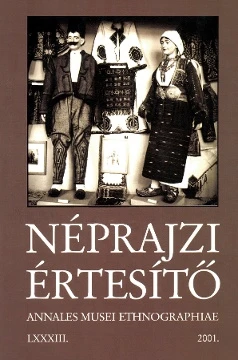Néprajzi Értesítő 83 (2001)
2.230 HUF
Néprajzi Múzeum, Budapest,2001. 154 p.
27 készleten
Tartalom
Konrad Vajna: Are We Able to Curate “Europe”? Work Strategies of the New Museum of European Cultures in Berlin in Co-operation with European Networks 11
Franz Grieshofer: The Contemporary Role of Ethnography Museums 15
Zoltán Fejős: The Museum of Ethnography in Budapest: Past and Present 23
Damodar Frlan: Ethnographic Museums in Croatia: History, Challenges, and Perspectives 35
Andrzej Rataj: Ethnographic Museums in Poland: Between the Past and the future 41
Marta Pastieriková: Slovak Museum of Ethnology at the Beginning of the 21st Century 47
Nadezhda Teneva: National Ethnographic Museum, Sofia: Exhibitions, audience and problems 53
Magdalena Molnar: The Romanian Museums at the Beginning of the 21st Century 63
Svetlana Mitrovic: A Century of a Museum 69
Vesna Marjanovic: The Ethnographic Museum: Keepers of the National Identity or the Exotic Places of Knowledge in the 21st Century 75
Liudmyla Bulhakova: Role and Place of Ethnographic Expositions in the Network of Museums in Ukraine 81
Irena Keršič – Bojana Rogelj Škafar – Polona Sketelj – Janja Žagar: Selection, Collection and interpretation. On the Criteria and Strategies of Collecting Material Cultural Heritage and their Ethnological Interpretations 81
Andina Vargatu: Some Aspects of the Policy of the Astra Museum Complex 99
Sasa Sreckovic: What Kind of Entrepreneurship is Possible in the Ethnographic Museums? 107
Grzegorz Graff: The Museum and its Educational Activities 113
Mirella Decheva: Ethnographic Exhibition as a Way of the Intercultural Communication: the Experience of the Bulgarian National Ethnographic Museum 117
Iryna Horban: Ethnographic Museums and Perspectives of Ethonology in Ukraine 123
Elena Barbulescu: The Ethnographical Museum and its Long Term Perspectives 127
György Balázs: Collections management and preventive conservation at the Museum of Ethnography in Budapest 131
Gábor Wilhelm: Ethnographic museums and challenges at the beginning of the 21st century 145
Csak bejelentkezett és a terméket már megvásárolt felhasználók írhatnak véleményt.



Értékelések
Még nincsenek értékelések.